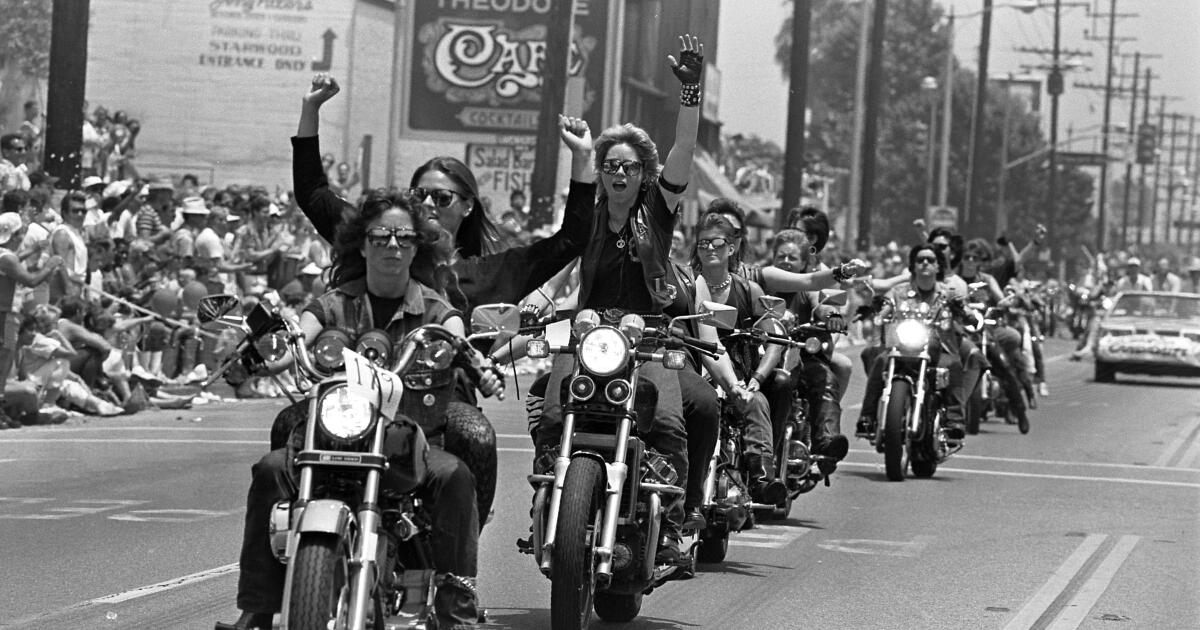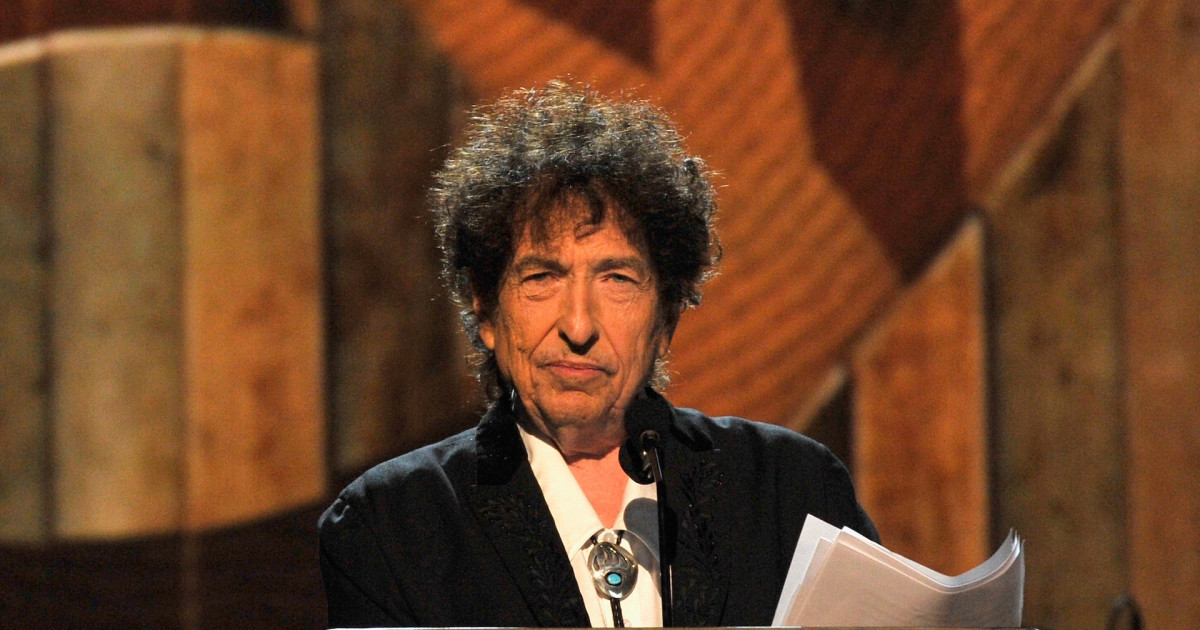She told TV viewers she was gay and lost her job. Unlike Jimmy Kimmel, there was no second chance

On a fateful day in 1977, Sallie Fiske faced the studio cameras for the last time.
The pioneering woman of early L.A. television had hosted a fluffy afternoon show on KCOP-TV in the 1950s called “Strictly for Women” and later served as an evening news producer. She later made her way back on the air at KCOP for another show. It was at the height of singer Anita Bryant’s antigay crusade, and Fiske felt compelled to tell her viewers that she was a lesbian.
The station swiftly fired her, and Fiske’s career in television was over.
I thought about this long-forgotten cancellation this week after ABC temporarily pulled Jimmy Kimmel off the air after comments he made about Charlie Kirk’s alleged killer sparked outrage on the right.
Sallie was my first editor, and I met her more than a decade after her KCOP firing. She had reinvented herself as an activist newspaper publisher, and I snagged a summer internship at the West Hollywood Paper.
Crossing Melrose Avenue
My first day brought profound culture shock. I grew up in the Fairfax District, which at the time was a sleepy working-class Jewish neighborhood known for its delis and bakeries. But cross Melrose Avenue and you enter West Hollywood, a mecca of trendy boutiques, fancy restaurants, Rolls-Royces parked in valet lots, art galleries and, of course, gay bars and bathhouses.
To a 17-year-old, the newsroom was mesmerizing. This was the late ‘80s and the talk in West Hollywood was dominated by AIDS hospices, Wolfgang Puck, David Hockney, Elizabeth Taylor and TexMex cuisine. Sallie was the ringleader, smoking at her desk and regularly erupting with a volcanic laugh.
In my eavesdropping, she introduced me to a new way of thinking. Sallie spoke with warmth and empathy about those on the margins, the gay teen prostitutes, the transgender people, the AIDS sufferers abandoned by family, the homeless people who even back then were setting up their camps in alleys.
These were people I just assumed you should avoid.
Yet over the summer, I could feel my mind being changed by her empathy and rage at the forces she felt were killing her community as a plague spread. Then one afternoon, I interviewed two men who were HIV-positive about a rally they were planning. One extended his hand and we shook. No big deal. But moments later, doubts crept into my mind, and I casually made a detour to the men’s room and scrubbed my hands with soap.
Lessons it was easier to ignore
Of course, that never made it into my report to Sallie. And that was the least of my secrets.
I was gay, still in the closet, terrified and too timid to frame what was going on all around me as my story, too. I left the paper, relieved that my secret was still intact. Now, I am haunted by what could have been had I told the truth.
I didn’t know about Sallie’s television coming out until my colleague Elaine Woo published her obituary in 2004.
“She had been in the closet her whole life. She just felt, ‘I can’t take it anymore,’” fellow activist Ivy Bottini told Woo.
A grim trade-off
Sallie’s papers are housed at the ONE National Gay & Lesbian Archives at USC. I went there this weekend and found nothing about her firing from KCOP. But there was one essay from that period that spoke to her thinking.
She described some of L.A.’s first big Pride parades in the mid-1970s and how some gay elites privately balked at what they saw. Too flamboyant. Too in-your-face. These raunchy displays set us back. It was only after conservatives placed a measure on the ballot that would have banned gay people from teaching in California schools that the upper classes saw the power of activism, she wrote. She called the successful fight against Proposition 6 a “coming out for the middle class.”
“It showed the public at large we covered the whole spectrum of society, that we could not be dismissed.”
Jimmy Kimmel returned to the air Tuesday, an opportunity Sallie never got. I wonder how she would feel about her trade-off: An obituary focused on a lifetime of activism, but at the price of losing her first career simply for telling the truth.
Today’s top stories
Arnold Schwarzenegger aims to terminate gerrymandering once again in California
The former California governor, who championed the creation of an independent commission to draw California’s congressional districts, returned to state voters’ TV sets on Tuesday in a new ad opposing a November ballot measure by state Democrats to boost their party’s ranks in Congress.
A committee opposing Proposition 50, which would replace districts drawn by an independent commission with ones crafted by partisans, plans to spend $1 million per day airing the ad statewide.
Schwarzenegger describes the ballot measure as one that does not favor voters but is in the interest of entrenched politicians.
The aftermath of a late summer storm in San Bernardino County
A late summer monsoon that swept over Southern California last week, triggering mudslides and flash floods, also destroyed multiple homes and led to a child’s death, officials said.
The flash flooding washed away a vehicle in Barstow, killing 2-year-old Xavier Padilla Aguilera and injuring his father.
Among the homes destroyed was one owned by a couple expecting their fourth baby. The couple also lost most of their family pets.
An L.A. petition alleges ‘ethnic cleansing’ by federal immigration agents
Rep. Maxine Waters and a group of U.S. citizens announced they were petitioning the United Nations to investigate the Trump administration immigration sweeps for potential human rights violations.
The announcement came one day before President Trump was slated to speak before the U.N. General Assembly.
Federal immigration authorities dismissed the petition as a dangerous stunt that would inflame tensions.
More big stories
Security cameras captured a man drawing a swastika outside a Beverly Hills elementary school on Monday, which marked the start of the Jewish holiday Rosh Hashana.
Jimmy Kimmel returned to ABC Tuesday night with an emotional monologue defending free speech: “We have to stand up.”
American Airlines failed to divert an eight-hour flight after a California man suffered two strokes, a jury found.
A Southern California man who served 38 years for a gory murder he did not commit settles for $25 million.
Check your freezer: The FDA has expanded a recall on radioactive frozen shrimp.
Will the Reel Inn rise again? The iconic seafood shack is in limbo with the state.
Charlie Kirk preached “Love your enemies,” but Trump spews hate, argues columnist Jackie Calmes.
Who’s winning the redistricting fight? Columnist Mark Z. Barabak explains how to read the polls.
H-1B visas have always been a scam. Trump’s changes won’t fix the problem, argues columnist Michael Hiltzik.
This morning’s must reads
Other great reads
RFK Jr. wants an answer to rising autism rates. Scientists say he’s ignoring some obvious ones.
‘The original slow food people’: Why a California tribe spent big money on a global food gathering.
How Bill Russell stayed connected to baseball, and reconnected with the Dodgers.
For your downtime
Going out
Travel: Times staff writer Hailey Branson-Potts is on a quest to see every lighthouse in California. Here are 14 of the most spectacular ones in the state.
Concerts: Fifty years after “Lovin’ You,” Minnie Riperton will be honored tonight with a tribute concert at the Hollywood Bowl. Here’s what her music means half a century later.
Festivals: Beyond Fest, running Sept. 23-Oct. 8, will screen more than 90 features at the Egyptian, Aero and Los Feliz 3. Here’s how it became L.A.’s best film festival.
Staying in
Music: Pulp nearly ceased to exist. 24 years later, their new album “More” marks a triumphant return.
Recipes: Here’s a recipe for spaghetti and meatballs.
✏️ Get our free daily crossword puzzle, sudoku, word search and arcade games.
And finally … the photo of the day
Today’s great photo is from Times contributor Roger Kisby at “Phasmagorica,” a séance reimagined as art that attempts to conjure the feeling of a séance in late 1880s America.
Have a great day, from the Essential California team
Jim Rainey, staff reporter
Hugo Martín, assistant editor, fast break desk
Kevinisha Walker, multiplatform editor
Andrew Campa, weekend writer
Karim Doumar, head of newsletters



